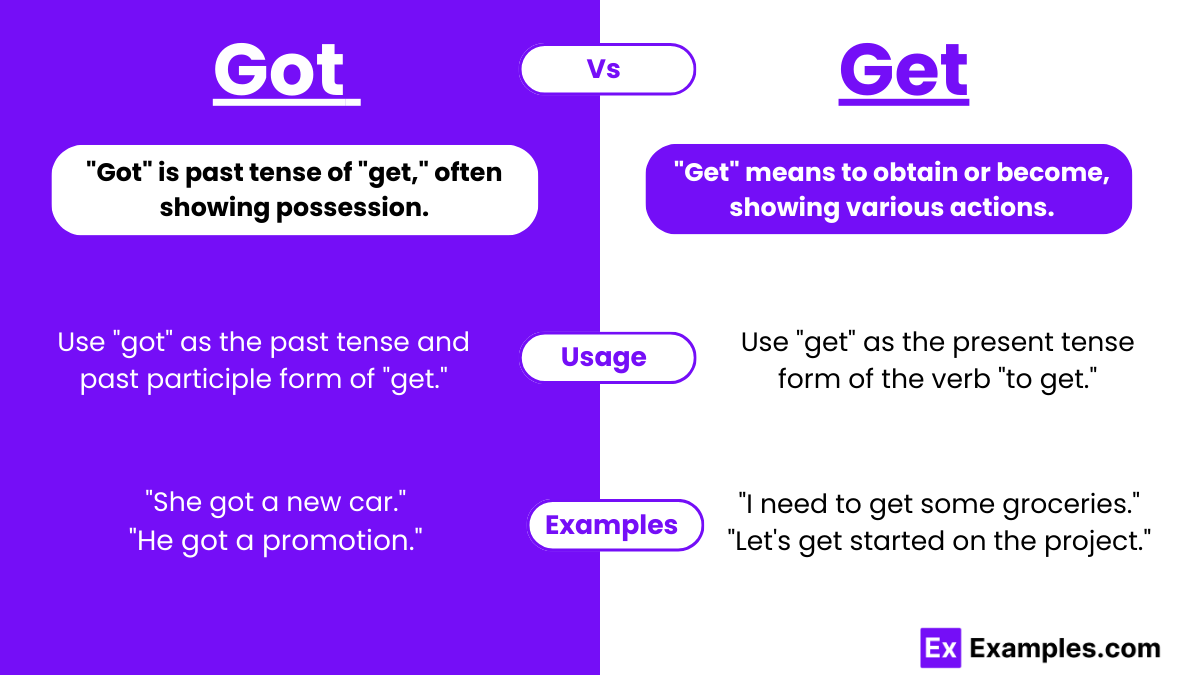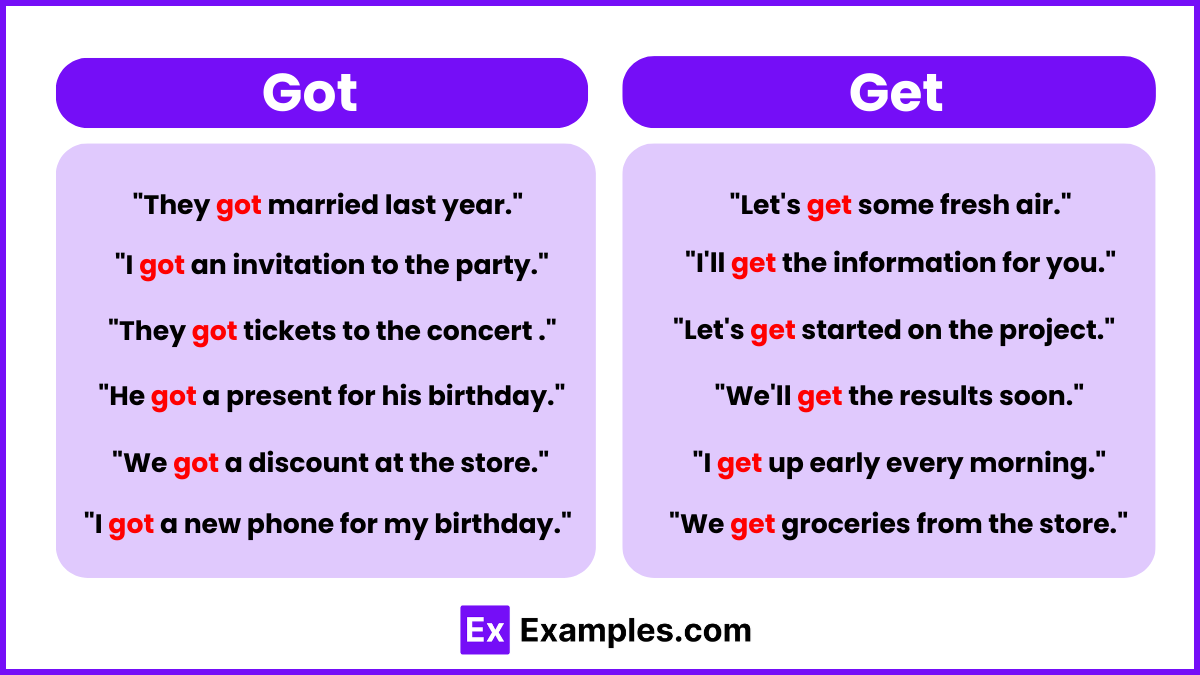Got vs Get – Examples, Differences, Usage, Tips
In the rich tapestry of the English language, few duos provoke as much intrigue and confusion as “got” and “get.” These seemingly simple words, both rooted in the verb “to get,” carry a plethora of meanings and nuances that can perplex even the most seasoned language learners. For students navigating the labyrinth of grammar rules and linguistic subtleties, discerning when to use “got” or “get” can be a daunting task, yet mastering this distinction unlocks a treasure trove of expressive possibilities.
At first glance, “got” and “get” may appear interchangeable, but their usage diverges across various contexts, imparting distinct shades of meaning to sentences. From casual conversations to formal writing, understanding the subtle nuances between these terms is paramount for effective communication. In this article, we embark on a journey through examples and explanations, illuminating the complexities of “got” versus “get” to empower students with the linguistic acumen needed to navigate the English language with confidence and precision.
Got and Get – Meanings
Got: “Got” is the past tense and past participle form of the verb “to get.” It typically indicates possession, acquisition, or attainment of something. Additionally, “got” can convey the idea of understanding or comprehension in informal contexts. For example, “She got a new car” or “I got the message.”
Get: “Get” is a versatile verb with various meanings, including to obtain, acquire, receive, or become. It denotes the action of obtaining something or undergoing a change in state or condition. “Get” is also used to express actions such as fetching, bringing, or reaching. For instance, “She gets good grades” or “I get tired after work.”
Summary
In brief, “got” and “get” both stem from the verb “to get” but serve distinct purposes. “Got” typically signifies possession or acquisition, while “get” encompasses a broader range of meanings, including obtaining, receiving, or undergoing change. Both convey actions related to acquiring or achieving something, yet “got” often denotes past tense, while “get” implies present or future actions. Their nuances provide richness to English language expression, enabling nuanced communication in various contexts.
Difference Between Got and Get
Navigating the differences between “got” and “get” is essential for clear communication in English. Here, we delve into their distinctions to clarify when to use each term accurately.
| Aspect | Got | Get |
|---|---|---|
| Form | Past tense and past participle of “get”. | Present tense form of the verb “get”. |
| Time Reference | Typically indicates past actions. | Denotes present or future actions. |
| Possession | Often signifies possession or acquisition. | Conveys the act of obtaining or receiving something. |
| Past Comprehension | Can indicate understanding or comprehension. | May imply understanding or awareness in present or future contexts. |
| Usage in Context | Commonly used in past tense statements. | Employed in present or future tense statements. |
| Examples | “She got a new car.” | “I get tired after work.” |
| Acquisition | Indicates having received or obtained something. | Expresses the act of obtaining or acquiring something. |
| Change in State | May denote a change in possession or status. | Often implies a change in condition or state. |
| Informal Usage | Used conversationally for understanding or comprehension. | Employed casually to denote various actions. |
| Frequency | Less commonly used compared to “get”. | More frequently used in everyday language. |
Examples of Got and Get
Exploring examples of “got” and “get” elucidates their usage nuances in English communication. Let’s delve into specific instances where each term is employed accurately.
Examples of Got:
- She got a promotion at work.
- They got married last year.
- I got a new phone for my birthday.
- He got the highest score in the class.
- We got lost in the city.
Examples of Get:
- I get up early every morning.
- She gets good grades in school.
- They get along well with their neighbors.
- We get groceries from the store every week.
- He gets excited about new challenges.
When to Use Got and Get
Understanding when to use “got” and “get” is crucial for accurate language usage. Let’s delineate the contexts in which each term is appropriately employed.
Usage of “Got”:
- Use “got” as the past tense and past participle form of “get.”
- Employ “got” to indicate past actions or states, such as possession or acquisition.
- Use “got” in past tense statements or narratives to convey completed actions.
- Choose “got” when referring to understanding or comprehension in informal contexts.
- Use “got” when denoting possession or attainment of something in the past.
Usage of “Get”:
- Use “get” as the present tense form of the verb “to get.”
- Employ “get” to indicate ongoing or future actions, such as obtaining, acquiring, or becoming.
- Use “get” in present or future tense statements to convey actions happening now or yet to occur.
- Choose “get” when expressing the act of obtaining or receiving something in the present or future.
- Use “get” in various contexts to denote actions like fetching, bringing, or reaching.
Tips for Got and Get
- Past vs. Present: Remember that “got” is used for past actions or states, while “get” is for present or future actions.
- Past Tense Clarity: Reserve “got” for past tense statements to convey completed actions or states.
- Present Action: Use “get” to express ongoing or future actions, indicating actions happening now or yet to occur.
- Understanding vs. Acquisition: Employ “got” to indicate possession, acquisition, or comprehension in the past.
- Versatility of “Get”: Recognize the versatility of “get,” which encompasses various meanings like obtaining, acquiring, or becoming.
- Consistency: Maintain consistency in tense usage when using “got” and “get” within the same context.
- Contextual Appropriateness: Choose the appropriate term based on the context of your sentence to convey the intended meaning accurately.
- Informal Usage: Use “got” conversationally for understanding or possession, while “get” is used casually for various actions.
- Practice and Observation: Enhance proficiency by practicing usage in sentences and observing how native speakers employ these terms.
- Consultation: When in doubt, refer to reliable grammar resources or consult language experts for clarification on usage nuances.
FAQs
Is it Correct to Say Get or Got?
Both “get” and “got” are correct, but their usage depends on the context. “Get” is present tense, while “got” is past tense. Choose the appropriate form based on when the action occurred in the sentence.
Why Do People Say You Got It?
Saying “you got it” is a colloquial way of expressing understanding or agreement. It’s informal but commonly used to affirm comprehension or acknowledgment of a request or task.
Is it Okay to Use Got in a Sentence?
Yes, it’s perfectly okay to use “got” in a sentence, particularly when referring to past actions or states. “Got” is the past tense and past participle form of the verb “to get.”
Did You Get or Got?
The correct form depends on the tense needed in the sentence. Use “did you get” for present tense questions and “did you got” is incorrect. For past tense questions, use “did you get.”
Which is Correct: If You Get It or If You Got It?
Both are correct, but they imply different timings. “If you get it” suggests a present or future scenario, while “if you got it” implies a past situation. Choose based on the intended timeframe of the action.





